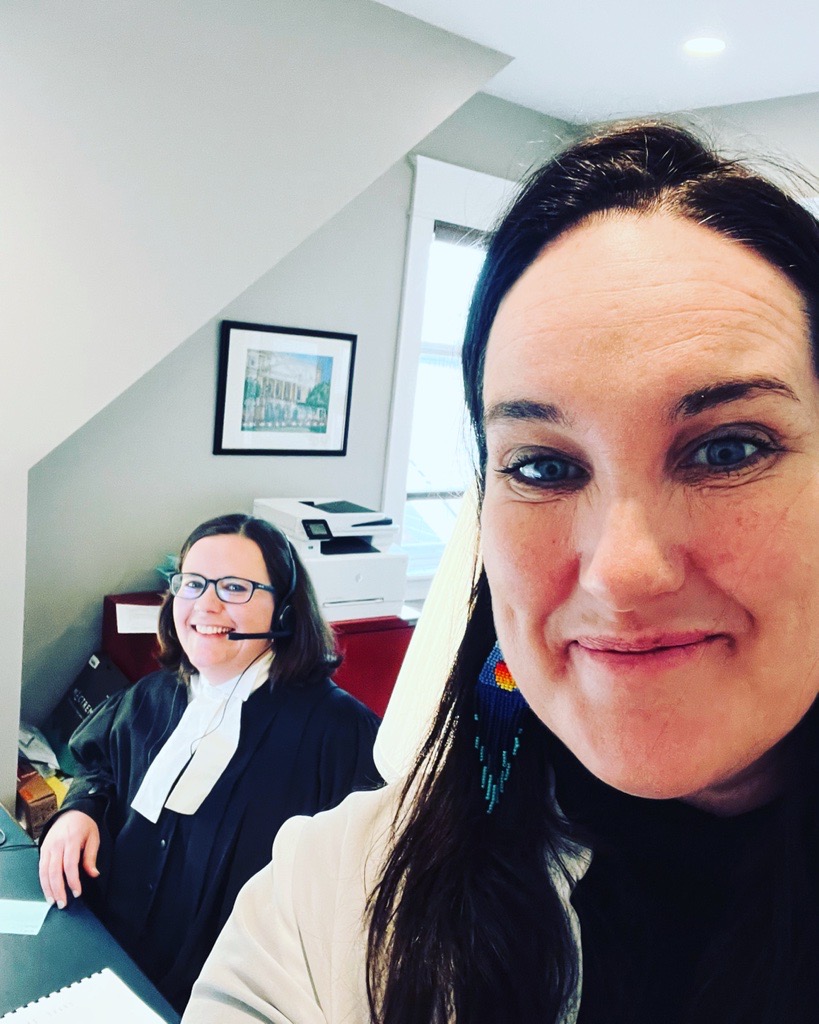-
Accessibility
Accessibility
- Français
CAEFS undertakes legal advocacy to uphold the rights of criminalized women and gender-diverse people. This work includes participation in public inquests, constitutional challenges, supreme court interventions and more. You can learn about some about our recent legal work below.
In 2010 CAEFS filed a Human Rights Case on behalf of all federally sentenced women
with the Canadian Human Rights Tribunal. Information from our years of advocacy and monitoring conditions of confinement will be used as evidence in this case.
In March 2022 CAEFS intervened at the Supreme Court of Canada (SCC) in R v. Sharma. In our submission, CAEFS argues that the persistent absence of substantive equality for Indigenous women who become involved with the criminal justice system should inform the Court’s s. 7 of the Charter analysis without requiring any engagement with the framework that would otherwise govern a discrimination inquiry under s. 15 of the Charter. In plain terms, we are arguing that the court should consider the implications of systemic discrimination (usually looked at under s. 15) when considering the arguments under gross disproportionality under s. 7. CAEFS was represented by Emilie Taman (Champ and Associates) and was one of 20 interveners in the case.
Learn more about our argument and intervention:

In this video Emilie Coyle, the Executive Director of CAEFS, interviews Emilie Taman (Champ Law and Associates). Taman was CAEFS’ counsel for our Supreme Court of Canada intervention in R v Sharma. They discuss what it means to intervene at the Supreme Court of Canada, what our argument was, and more. Closed captioning is available in English and French.
Click here to see our quick overview on what an intervention is, why it’s important for this case and for Cheyenne Sharma, and to find out what is included in our intervention submission. We are grateful to be supported through this process by Emilie Taman from Champ Law & Associates, and to take this step towards our goal for a world free of prisons and incarceration.
“Dry-celling” is a form of solitary confinement where someone suspected of carrying contraband is held under direct observation, with the lights at all time, and with no running water for an indefinite period of time.
Lisa Adams, who had been held in a dry cell for 16 days while incarcerated at the Nova Institution, challenged the law that gave prison management the authority to hold her in a “dry cell” for an indefinite period of time using sections 7, 12, and 15 of the Charter. The Elizabeth Fry Society of Mainland Nova Scotia worked closely with Ms. Adams, along with the BC Civil Liberties Association and CAEFS, to provide support and to bring public attention to the cruel and inhumane practice of dry-celling.
In November 2021, a Nova Scotia supreme court judge struck down the law that permits the use of dry celling, finding that it breaches section 15 of the Charter. Judge Keith gave the Federal Government 6 months to change the law to bring it in line with the Charter. In April 2022, As part of the 2022 Federal Budget, the government proposed the introductions of amendments to the Corrections and Conditional Release Act (Act) that will prohibit the Correctional Service of Canada from placing people in prison, who are suspected of concealing contraband in the vaginal cavity, in dry cells. A measure that, they say, will bring the Act into compliance with the Canadian Charter of Rights and Freedoms. CAEFS continues to advocate for the elimination of dry-celling and all forms of solitary confinement.
Learn more about dry-celling and other forms of solitary confinement:
CAEFS and the Council of Elizabeth Fry Societies of Ontario (CEFSO) had standing in the inquest into the death of Delilah Blair – a 30-year old Indigenous woman who died while in custody at the South West Detention Centre (SWDC). The crisis of missing and murdered Indigenous women and girls is inextricably linked to the ways in which the state continues to disproportionately punish and incarcerate
Indigenous women and girls. Blair’s death makes the connection between these crises heartbreakingly clear and requires action on the part of all levels of government. Read more below:
CAEFS is working to support the inquest into the death of a woman at the Grand Valley Institution in 2016. This woman’s death is further proof that that prisons are no place for individuals with mental health issues. As an organization with a substantial interest in the Inquest, CAEFS has been granted standing to take an active part in this open inquest proceedings and to call expert witnesses. For more information, please contact us.
In 2017, CAEFS Atlantic regional advocates assisted a woman in submitting a public complaint to the Civilian Review and Complaints Commission of the RCMP (CCRC) regarding the illegal strip search that she endured in 2013. The CCRC subsequently conducted a public interest investigation into her complaint and a final report was shared with CAEFS in September 2020, concluding that the strip search that she had endured was unreasonable and was contrary to the RCMP’s national operational policy on strip searches. Upon receipt of the final report, CAEFS worked with Emma Halpern – a regional advocate with CAEFS and the executive director of the Elizabeth Fry Society of Mainland Nova Scotia – who had helped to file the complaint, to set up a meeting with the RCMP Commissioner, Brenda Lucki. The aim of this meeting was to allow the woman to speak directly to the Commissioner about how the strip search had affected her and to seek concrete action from the RCMP to ensure that this treatment did not continue. Since that initial meeting, there has been an exchange of correspondence between CAEFS and the RCMP Commissioner as we continue to push for action to ensure that similar incidents do not occur.